Malta
A Mediterranean island located 58 miles South of the Italian island of Sicily, comprising Malta and two smaller islands of Gozo and Comino. The history dates back to the Phoenicians.
Napoleon arrived in June 1798 and in August the Maltese learned that Nelson had sunk the French “Le Orient” off the coast of Egypt that was laden with looted treasures from Malta. In October Nelson laid siege to the French forces in Malta and Gozo capitulated on the 24 October with a Royal Marine Captain raising the British flag. For a further 2 years the siege continued with Valletta finally surrendering 5 September 1800. In March 1803 Napoleon demanded Britain surrender Malta, on 15 June 1803 Nelson arrived on Malta announcing Britain and France were once again at war and Malta became a major Military and Naval base for the British.
The Crimean war of 1853 -56 saw Malta acting as a Supply Base for the Naval fleets of Britain & France, who were friends again, with Malta acting as a Hospital and treatment centre for wounded personnel from the war zone.
The Suez canal opened in 1869 shortening the sea route to the East and increasing the importance of Malta.
WW1 saw increased activity with the British and French Navies using Malta as Headquarters during the Anglo-French 1915 campaign in the Dardanelle’s. After the disastrous campaign Malta beame the Nurse of the Mediterranean with 25,000 beds in 30 hospitals plus a tented convalescent camp to cater for the sick and wounded.
Several Prisoner of War camps were also established on the island and the Japanese had a fleet of naval vessels based out of Malta engaged on Convoy duties throughout the Mediterranean.
The close proximity of Sicily was devastating to Malta during WW2 after Italy entered the war in June 1940 its Air Force constantly bombed Malta and the German Air Force from Sicily in January 1942 waged a massive campaign to destroy the island dropping almost 10,000 tons of bombs on Malta between February – April. Malta taking an aerial assault unprecedented in the annals of Warfare so much so that King GVI awarded Malta the George Cross, the highest civilian medal of bravery.
Malta was used as a Major Military Base during the 1956 Suez crisis.
Mail carrying British stamps from the Crimean War were cancelled at Malta from April 1855 – September 1856 and these are very rare.
The stamps of Great Britain were used on overseas mails from September 1857 until 31 December 1884. Maltese stamps for Internal use began to be issued from 1 December 1860 on an experimental basis until the first Malta definitive were issued 1 January 1885. All mail carrying adhesives prior to 1 January 1885 are difficult to very rare.
-
1915 MALTA – NEW ZEALAND…GALLIPOLI CAMPAIGN [22831]
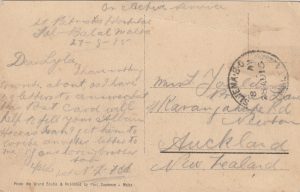 $150.00
Add to cart
More Info...
$150.00
Add to cart
More Info... -
1917 MALTA – NEW ZEALAND…WW1 OAS PPC [22826]
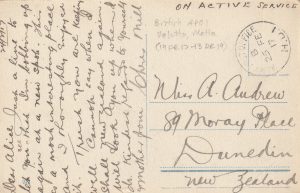 $25.00
Add to cart
More Info...
$25.00
Add to cart
More Info... -
1943 GB – CANADA..WW2 APO S.C. 2 & RAF CENSOR R8/233.. [22612]
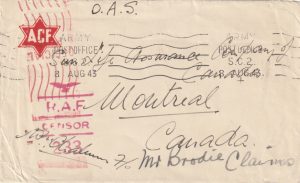 $150.00
Add to cart
More Info...
$150.00
Add to cart
More Info... -
1915 SWITZERLAND – MALTA…RED CROSS AGENCY for P.O.W. [22505]
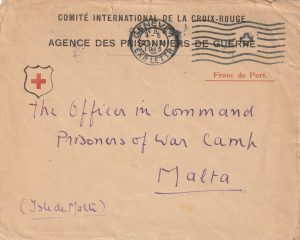 $150.00
Add to cart
More Info...
$150.00
Add to cart
More Info... -
1918 MALTA – ALGERIA..WW1 REGISTERED MAIL.. [22410]
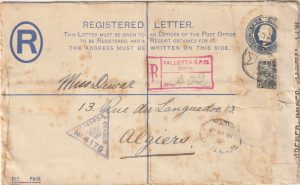 $200.00
Add to cart
More Info...
$200.00
Add to cart
More Info... -
1956 MALTA-GB ..OPERATION MUSKETEER(1956 SUEZ CRISIS) NAVAL TROOPSHIP.. H.M.T. EMPIRE CLYDE … [22333]
 $85.00
Add to cart
More Info...
$85.00
Add to cart
More Info... -
1956 MALTA- GB ..OPERATION MUSKETEER(1956 SUEZ CRISIS) c/o FOF’s STAFF c/o F.M.O. MALTA… [22332]
 $50.00
Add to cart
More Info...
$50.00
Add to cart
More Info... -
1956 MALTA ..OPERATION MUSKETEER(1956 SUEZ CRISIS) O.H.M.S…COMMAND PAYMASTER / MALTA ..INTERNAL.. [22331]
 $150.00
Add to cart
More Info...
$150.00
Add to cart
More Info... -
1956 MALTA-GB ..OPERATION MUSKETEER(1956 SUEZ CRISIS) O.H.M.S…COMMANDER-IN-CHIEF / MEDITERRANEAN STATION .. [22330]
 $85.00
Add to cart
More Info...
$85.00
Add to cart
More Info... -
1956 MALTA..ROYAL NAVY SUEZ CRISIS TASK FORCE..HMS STRIKER.. [22329]
 $75.00
Add to cart
More Info...
$75.00
Add to cart
More Info... -
1956 MALTA..ROYAL NAVY SUEZ CRISIS TASK FORCE..HMS STRIKER.. [22328]
 $65.00
Add to cart
More Info...
$65.00
Add to cart
More Info... -
1956 MALTA-GB ..OPERATION MUSKETEER(1956 SUEZ CRISIS) O.H.M.S. FLAG OFFICER FLOTILLAS … [22327]
![1956 MALTA-GB ..OPERATION MUSKETEER(1956 SUEZ CRISIS) O.H.M.S. FLAG OFFICER FLOTILLAS ... [22327]](https://mikewhiteuk.com/images/22327-300x133.jpg) $75.00
Add to cart
More Info...
$75.00
Add to cart
More Info... -
1956 MALTA-GB ..OPERATION MUSKETEER(1956 SUEZ CRISIS) O.H.M.S… H.M.S. “PHOENICIA”.. [22326]
 $75.00
Add to cart
More Info...
$75.00
Add to cart
More Info... -
1956 MALTA-GB ..OPERATION MUSKETEER(1956 SUEZ CRISIS) O.H.M.S… FLAG OFFICER / SECOND IN COMMAND .. [22325]
 $85.00
Add to cart
More Info...
$85.00
Add to cart
More Info... -
1956 MALTA-GB ..OPERATION MUSKETEER(1956 SUEZ CRISIS) O.H.M.S. OFFICE OF FLAG OFFICER MALTA … [22323]
 $65.00
Add to cart
More Info...
$65.00
Add to cart
More Info... -
1956 MALTA-GB ..OPERATION MUSKETEER(1956 SUEZ CRISIS) NAVAL CENSORSHIP.. H.M.S. SURPRISE … [22324]
 $175.00
Add to cart
More Info...
$175.00
Add to cart
More Info... -
1956 MALTA-GB ..OPERATION MUSKETEER(1956 SUEZ CRISIS) 42 COMMANDO ROYAL MARINES … [22322]
 $85.00
Add to cart
More Info...
$85.00
Add to cart
More Info... -
1956 MALTA-GB ..OPERATION MUSKETEER(1956 SUEZ CRISIS) CENSORED.. [22321]
 $175.00
Add to cart
More Info...
$175.00
Add to cart
More Info... -
1956 MALTA-GB ..LEADING to OPERATION MUSKETEER(1956 SUEZ CRISIS) 40 COMMANDO ROYAL MARINES … [22320]
 $75.00
Add to cart
More Info...
$75.00
Add to cart
More Info... -
1956 MALTA-GB ..OPERATION MUSKETEER(1956 SUEZ CRISIS) GRENADIER GUARDS … [22319]
 $150.00
Add to cart
More Info...
$150.00
Add to cart
More Info... -
1956 MALTA-GB ..OPERATION MUSKETEER(1956 SUEZ CRISIS) ARTILLERY UNIT.. [22318]
 $150.00
Add to cart
More Info...
$150.00
Add to cart
More Info... -
1916 MALTA..GHAIN TUFFIEHA CONVALESCENT CAMP.. [22317]
 $175.00
Add to cart
More Info...
$175.00
Add to cart
More Info... -
1939 MALTA..ROYAL CHRISTMAS MESSAGE .. [22316]
 $150.00
Add to cart
More Info...
$150.00
Add to cart
More Info... -
1939 MALTA – GB..OFFICE of COMMANDER in CHIEF, MEDITERRANEAN STATION.. [22315]
 $275.00
Add to cart
More Info...
$275.00
Add to cart
More Info...

